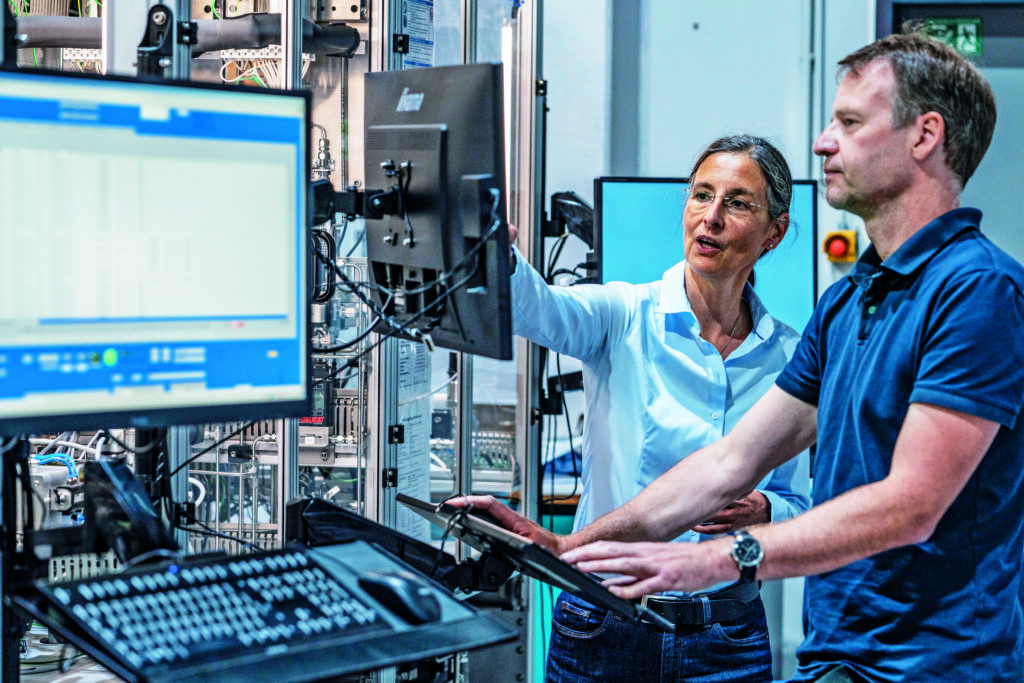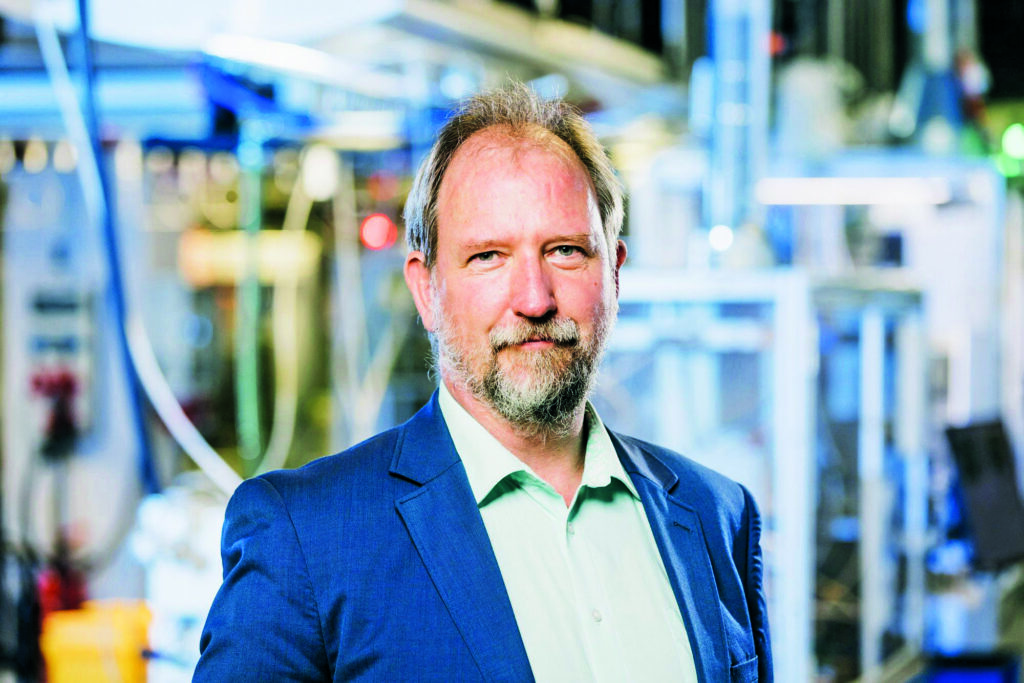Duisburg: A Hydrogen Hotspot
Germany has ambitions to become a hydrogen republic. The hydrogen and fuel cell center ZBT GmbH will play a key part in this project, which will benefit not only the Rhine and the Ruhr but also the wider economy. By David Huth
Joachim Jungsbluth enters his improvised office at The hydrogen and fuel cell center ZBT GmbH (ZBT) on Duisburg Campus. Opposite his desk is a kitchen counter where a colleague is making tea. Space is currently at a premium at ZBT – the price of rapid success.
Jungsbluth is relaxed about it. The engineer is the authorized representative at ZBT and senior expert hydrogen safety and implementation, responsible for developing the Hydrogen Innovation and Technology Centre. In May it got a new name: The Hydrogen Proving Area, or TrHy for short (pronounced like ‘try’ in English), which is being built on the Hüttenwerke Krupp-Mannesmann (HKM) steelworks site in the south of Duisburg. Jungsbluth has an office there too. All on his own.
‘We’ve been working on making hydrogen into a key technology for 20 years,’ explains the expert. Like many at ZBT, however, he had expected the breakthrough to come sooner. Yet hydrogen only really came to the fore in politics and the economy after the announcement of the energy transition. Now the idea is that in the long term it will replace fossil fuels and serve as a store for renewable energy. Climate-friendly production of hydrogen makes it possible to reduce CO2 emissions – especially in industry and transport.
Hydrogen is an advanced technology
Technologically, we don’t yet know enough to make use of green hydrogen on a large scale and develop products. So fundamental research has an important part to play. Where can we obtain hydrogen? Where can we store it? How can we distribute it? Dorothee Lemken, a scientist at ZBT in the Hydrogen Infrastructure department, is looking for answers to questions like this – and finding them. For instance, she researched how hydrogen can be transported across borders via the Rhine. ‘The most economically efficient way is to store it on ships in reusable containers. They can be easily moved between transporters, and the content doesn’t have to be reloaded,’ says the 53-year-old.

The hydrogen and fuel cell center ZBT GmbH
ZBT is a 100%-subsidiary of the University of Duisburg-Essen and arose from the fields of engineering, energy technology and electrical engineering. When the institute’s building was inaugurated in 2003, the centre had just 25 employees. Today it has 150.
ZBT is a leading international institute in fuel cell research, with 2,000 square metres of production and test facilities, chemical laboratories and high tech analytics. Prof. Dr. Angelika Heinzel headed the ZBT as scientific director and CEO for more than 20 years and contributed massively to its success. In 2021 Prof. Dr. Harry Hoster took over from her.
Another important area at ZBT is studying the quality of the new energy source. The quality analysis laboratory is unique in Europe in being able to identify the smallest particles of foreign matter: ‘After all, not all hydrogen is equal,’ explains Jungsbluth. If used in a fuel cell in a car or bus, for instance, it must be purer than if used in the steel industry. This is down to the temperatures at which it is ‘combusted’. In the automotive sector this mustn’t exceed 85°C, but far higher temperatures are necessary in furnaces.
The innovative research at ZBT is renowned internationally. Consequently, in autumn 2021 the Federal Ministry of Transport named the University’s affiliated institute as one of just four sites throughout Germany for a national hydrogen centre. The federal government will give TrHy 60 million euros in funding, the federal state will provide a further 50 million euros. By 2025 this will create a hotspot for the hydrogen industry in Duisburg, involving renowned partners such as Rheinmetall and HKM as well as RWTH Aachen University and the Jülich Research Centre. So in future the who’s who in hydrogen research and industry will meet in Duisburg. New companies are expected to move here and create jobs.

Unique test stands
‘We want TrHy to fill in current gaps, in order to boost the market for hydrogen rapidly,’ Jungsbluth affirms, nodding to two colleagues who are getting coffee. While partners will undertake research and development, TrHy will largely be in charge of the reality check: ‘If you want to develop a hydrogen industry, you have to test products in a suitable environment,’ says the 53-year-old.
ZBT already knows what this might look like: the test bed in front of the building is unique in Europe; it is possible to analyse and monitor every technical process and step that could take place in future at hydrogen filling stations – security is the top priority. For instance, they can check the practicality of dispensers, that is hydrogen filling pumps. Different storage devices work with differing pressures. So far, cars can be fast filled at a maximum of 900 bar, while pressure for filling trucks is still less than half. In future the aim is to improve the technology so that trucks and buses can be supplied with large quantities in a short time.
They are also planning to develop rules and standards for hydrogen in the building on the HKM site. Education and training is another element of the concept, because many of the professions that will have to deal with hydrogen have so far had little to do with it. The new hydrogen education centre is planned as a joint venture adjacent to TrHy involving the partners ZBT, Kraftwerksschule Essen (KWS), the port and the city of Duisburg.
Joachim Jungsbluth thinks it is logical for such a major project to take place in his home city. ‘It’s the largest steel manufacturing location in Europe and also has the largest inland port. It has a reputation as an international logistics hub with good access to waterways and the road and rail networks. So there’ll be no way around Duisburg as regards hydrogen in future.’



